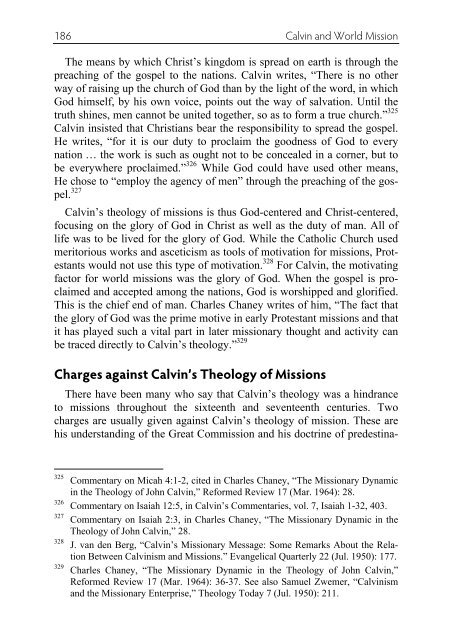Calvin and Missions - World Evangelical Alliance
Calvin and Missions - World Evangelical Alliance
Calvin and Missions - World Evangelical Alliance
You also want an ePaper? Increase the reach of your titles
YUMPU automatically turns print PDFs into web optimized ePapers that Google loves.
186 <strong>Calvin</strong> <strong>and</strong> <strong>World</strong> Mission<br />
The means by which Christ’s kingdom is spread on earth is through the<br />
preaching of the gospel to the nations. <strong>Calvin</strong> writes, “There is no other<br />
way of raising up the church of God than by the light of the word, in which<br />
God himself, by his own voice, points out the way of salvation. Until the<br />
truth shines, men cannot be united together, so as to form a true church.” 325<br />
<strong>Calvin</strong> insisted that Christians bear the responsibility to spread the gospel.<br />
He writes, “for it is our duty to proclaim the goodness of God to every<br />
nation … the work is such as ought not to be concealed in a corner, but to<br />
be everywhere proclaimed.” 326 While God could have used other means,<br />
He chose to “employ the agency of men” through the preaching of the gospel.<br />
327<br />
<strong>Calvin</strong>’s theology of missions is thus God-centered <strong>and</strong> Christ-centered,<br />
focusing on the glory of God in Christ as well as the duty of man. All of<br />
life was to be lived for the glory of God. While the Catholic Church used<br />
meritorious works <strong>and</strong> asceticism as tools of motivation for missions, Protestants<br />
would not use this type of motivation. 328 For <strong>Calvin</strong>, the motivating<br />
factor for world missions was the glory of God. When the gospel is proclaimed<br />
<strong>and</strong> accepted among the nations, God is worshipped <strong>and</strong> glorified.<br />
This is the chief end of man. Charles Chaney writes of him, “The fact that<br />
the glory of God was the prime motive in early Protestant missions <strong>and</strong> that<br />
it has played such a vital part in later missionary thought <strong>and</strong> activity can<br />
be traced directly to <strong>Calvin</strong>’s theology.” 329<br />
Charges against <strong>Calvin</strong>’s Theology of <strong>Missions</strong><br />
There have been many who say that <strong>Calvin</strong>’s theology was a hindrance<br />
to missions throughout the sixteenth <strong>and</strong> seventeenth centuries. Two<br />
charges are usually given against <strong>Calvin</strong>’s theology of mission. These are<br />
his underst<strong>and</strong>ing of the Great Commission <strong>and</strong> his doctrine of predestina-<br />
325<br />
Commentary on Micah 4:1-2, cited in Charles Chaney, “The Missionary Dynamic<br />
in the Theology of John <strong>Calvin</strong>,” Reformed Review 17 (Mar. 1964): 28.<br />
326<br />
Commentary on Isaiah 12:5, in <strong>Calvin</strong>’s Commentaries, vol. 7, Isaiah 1-32, 403.<br />
327<br />
Commentary on Isaiah 2:3, in Charles Chaney, “The Missionary Dynamic in the<br />
Theology of John <strong>Calvin</strong>,” 28.<br />
328<br />
J. van den Berg, “<strong>Calvin</strong>’s Missionary Message: Some Remarks About the Relation<br />
Between <strong>Calvin</strong>ism <strong>and</strong> <strong>Missions</strong>.” <strong>Evangelical</strong> Quarterly 22 (Jul. 1950): 177.<br />
329<br />
Charles Chaney, “The Missionary Dynamic in the Theology of John <strong>Calvin</strong>,”<br />
Reformed Review 17 (Mar. 1964): 36-37. See also Samuel Zwemer, “<strong>Calvin</strong>ism<br />
<strong>and</strong> the Missionary Enterprise,” Theology Today 7 (Jul. 1950): 211.

















